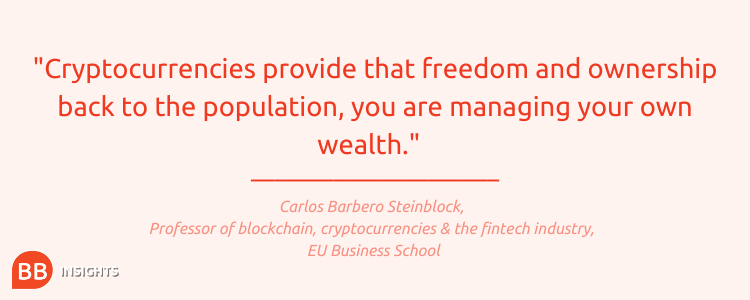Blockchain technology is best known as the tech that underpins cryptocurrencies. Bitcoin, Ethereum, and all the other 4000 cryptocurrencies operate via blockchain, making it one of the most important recent innovations in finance.
Here are four ways blockchain is revolutionizing fintech.
1. It creates a digital ledger
Blockchain is comparable to an accountant’s general ledger, according to Carlos Barbero Steinblock (pictured), lecturer in cryptocurrencies, blockchain, and the fintech industry at EU Business School, who offer a major in blockchain in their MBA program.
In a ledger, you have pages recording transactions, which are time-stamped and annotated, and blocks in a blockchain record transactions in the same way. By time-stamping every transaction and recording them chronologically, a blockchain can digitally log the entire life cycle of money as it flows and changes hands.

“It creates a never-ending chain that continues on and on as long as there are active people using it,” says Benjamin Xie, also a lecturer in cryptocurrencies and related topics at EU Business School.
This is important in the banking and accounting industries, where it is essential to have an accurate record of transactions.
“You form a life cycle of how money was deposited into the bank, where it originated from, how it is being used, and where it went afterwards,” says Benjamin.
Recording this automatically means blockchain vastly improves the efficiency of the process of recording transactions, reducing the amount of time needed to record ledgers, and the costs of recording them manually.
2. It protects against fraud
A blockchain is also decentralized, meaning no one has control of the chain. It can’t be altered in any way. Using distributed ledger technology each transaction, or block, is recorded via a node which can be any smartphone, computer, or larger server, and there is nothing linking the nodes.
Benjamin (pictured) explains that this immutability means a blockchain can log a complete, unchangeable financial record of every transaction, offering huge protection from fraud.

“It gives you more accountability for transactions and means fewer accidents will happen,” he explains. “You can’t point fingers with a blockchain; if the fraud goes back 100 years to a specific transaction and a specific person, you know who it is.”
While there is still a slight possibility of hacking a blockchain, such as when someone owns more than 50% of the nodes in a chain and can validate their own transactions, instances of this happening remain rare.
The combined value of all the cryptocurrencies available in 2021 is above $1.8 trillion, with Bitcoin alone worth more than $1 trillion. As entirely digital currencies made of code, the crypto market is a lucrative prize for any hacker.
But since Bitcoin was established in 2008 as the world’s first cryptocurrency and blockchain, the chain has never been hacked, because of its decentralized structure.
“The possibilities that it opens up in terms of security: this is where blockchain’s biggest innovation lies,” Benjamin says.
3. It removes third parties from transactions
Blockchain’s heightened security offers multiple advantages, one of which is that you can bypass traditional fraud prevention methods which require multiple parties to validate transactions.
Every financial transaction requires an authority to validate it, whether that is Visa or American Express processing your card payment, or the many people employed in investment banks as transaction validators.
“Sometimes we have up to 12 parties booking and resolving transactions, and they don’t work for free so that makes it expensive,” says Carlos.
In 2020, multinational investment bank and financial service provider, Citigroup, mistakenly made a $900 million payment due to failures in their validation process.
This kind of error would be impossible in a blockchain because of the decentralized network. Transactions on a blockchain are automatically validated as they are sent to all the nodes in the network for authentication. This removes the need for third parties, Carlos says.
“Through a blockchain we can get rid of all those layers and just pay for what really matters, which is the product or service we require.”

4. It democratizes money management
The most high-profile use of blockchain in fintech has been cryptocurrencies, which allow you to hold your money without a bank.
Those who purchase Bitcoin, Ethereum, or any other coin, can choose to hold their currency in their own digital wallets. Wallet-holders have a private key, which is needed to send and spend their crypto, and a public address allowing them to receive payments from others.
Those who have the keys are the sole owners of that coin. Unlike traditional currency there is no bank holding the money.
Carlos believes this is where the true value of blockchain in fintech lies. “Bitcoin and other cryptocurrencies provide that freedom and ownership back to the population,” he explains, “you are managing your own wealth, you don’t have to rely on or trust anyone else with your money.”
However, there is still risk involved with holding money this way. If you forget your private key or it is stolen there is no way of getting the money back, as you are solely responsible.
Many cryptocurrency holders choose instead to store their money with a custodian, who holds their coin like a bank. The largest of these services, Coinbase, has over 43 million users and holds $90 billion on the platform.
Carlos believes this misses the point of cryptocurrency. “That doesn’t provide you with freedom and authority over your own finances,” he says. The real benefit of blockchain is that it could allow everybody to control their own money using cryptocurrency.
“When people really start taking ownership and responsibility for their own wealth, that could take a big piece of the pie from the banks,” he says.
While blockchain impacts the financial industry in a number of ways, challenging the traditional idea of the banking establishment is where it could bring about the greatest changes.
Read next:
Cryptocurrency | What You Need To Know
BB Insights explores the latest research and trends from the business school classroom, drawing on the expertise of world-leading professors to inspire and inform current and future leaders



